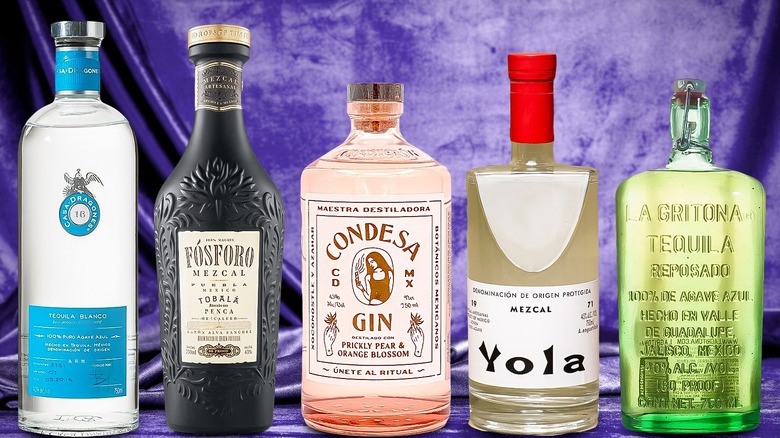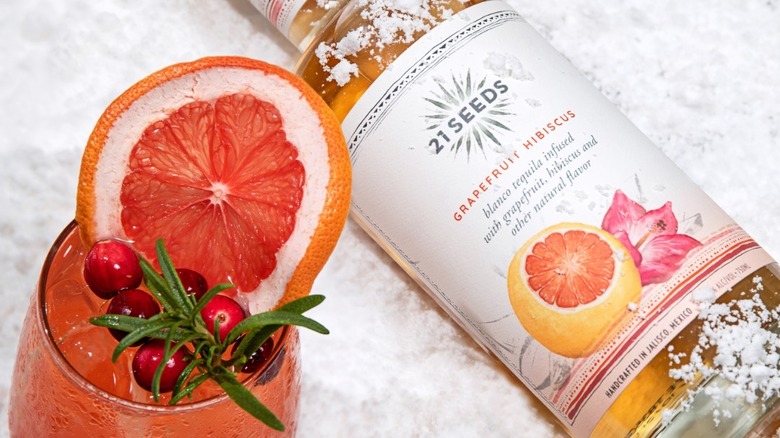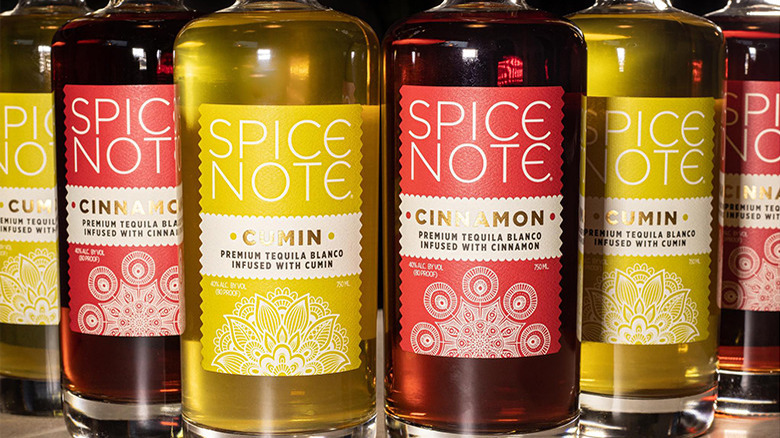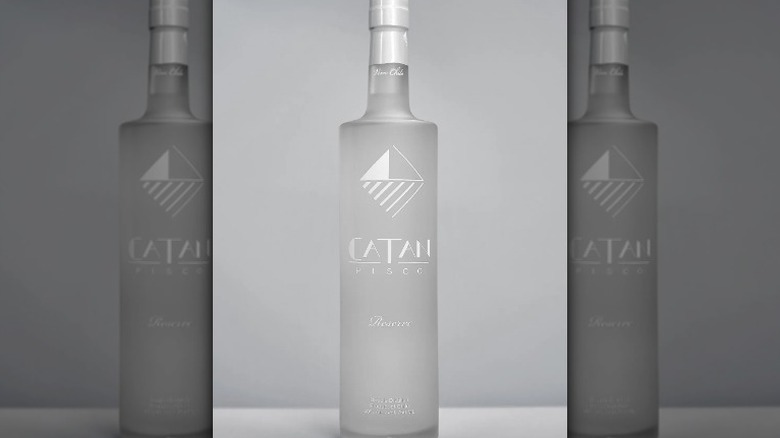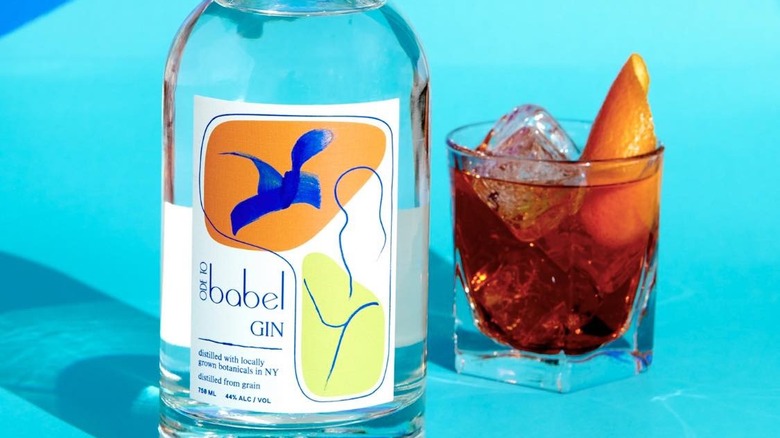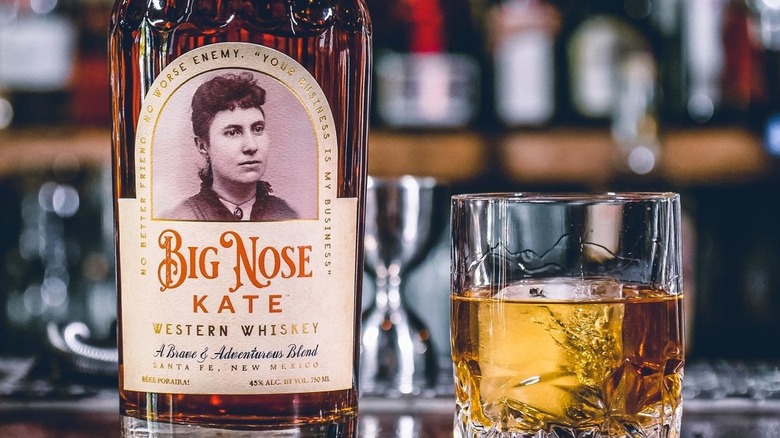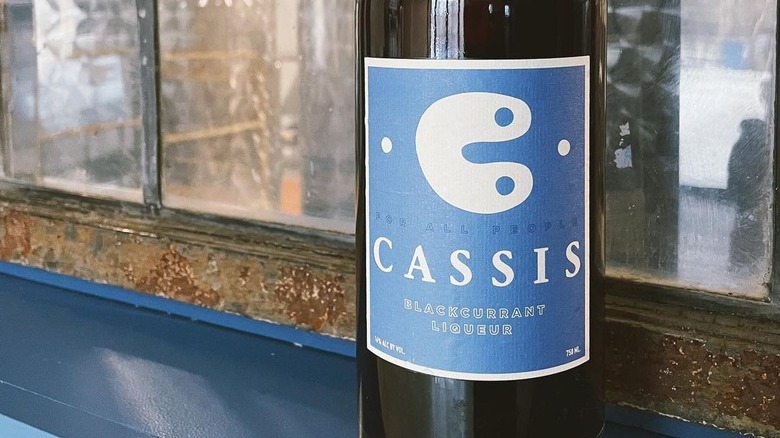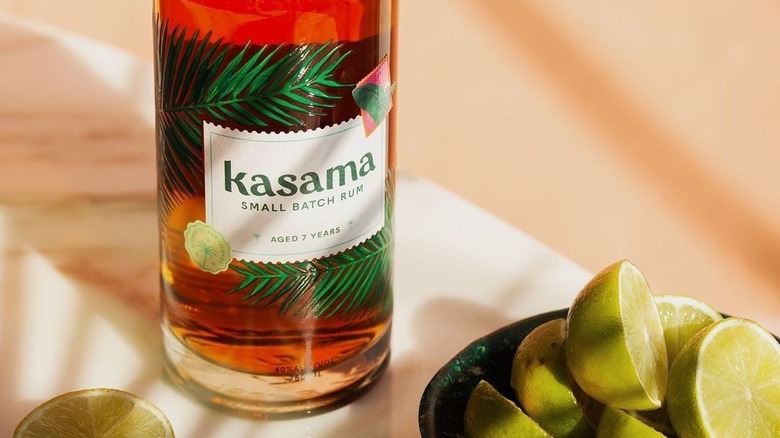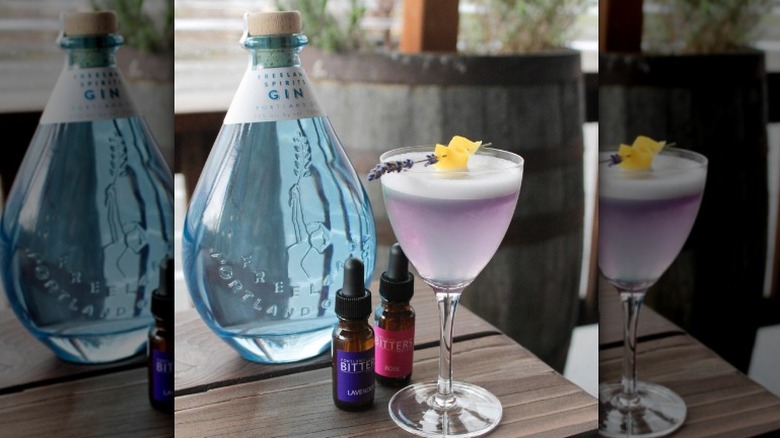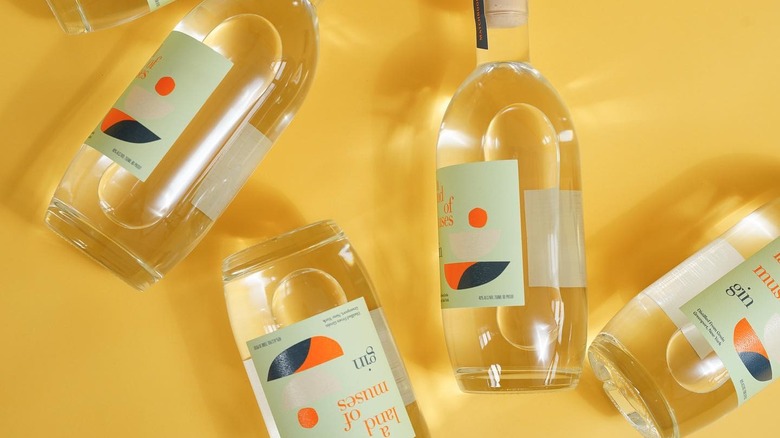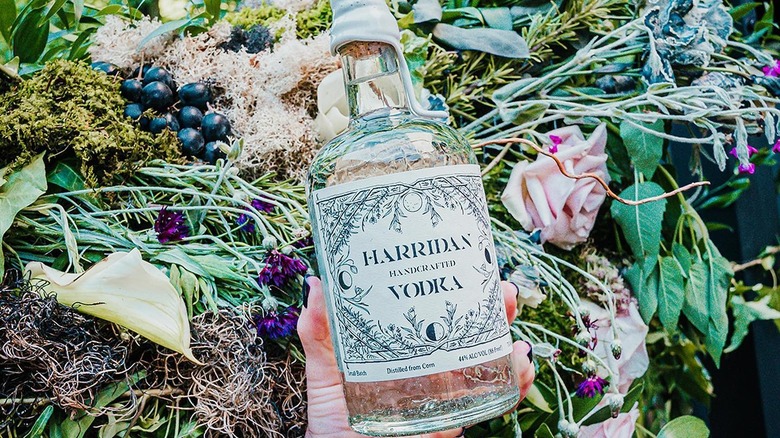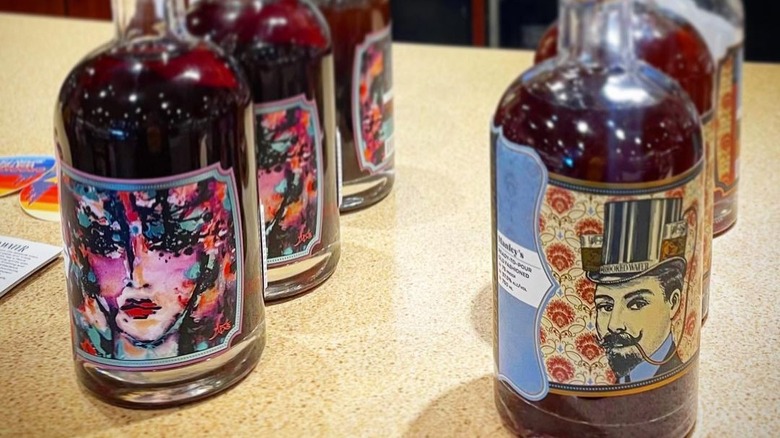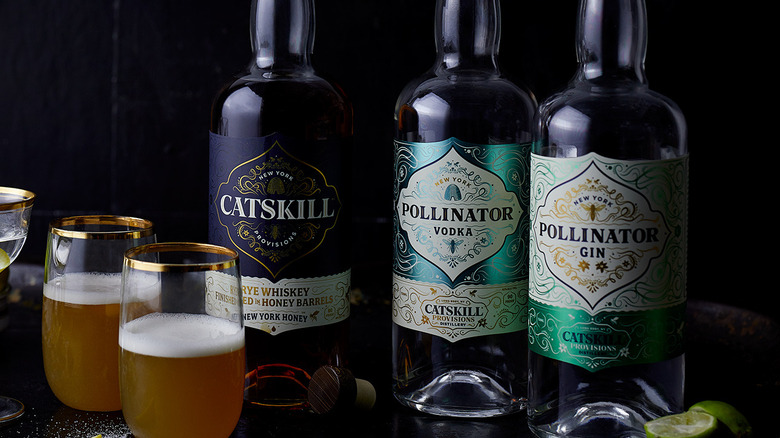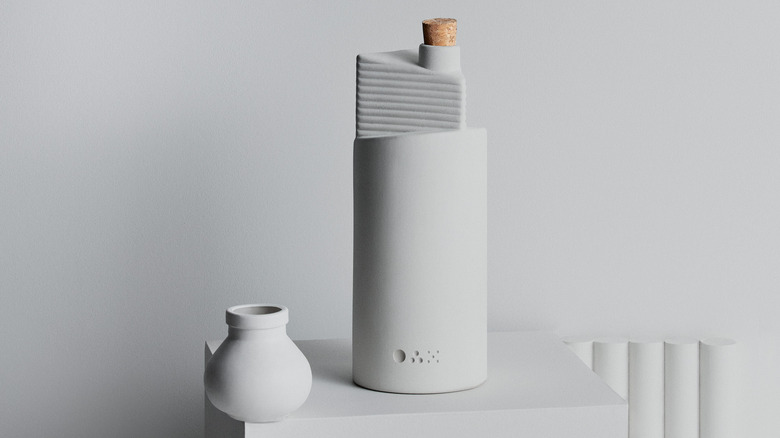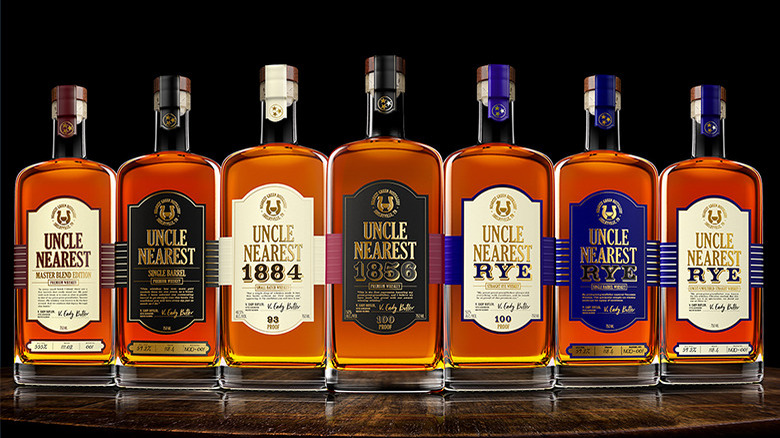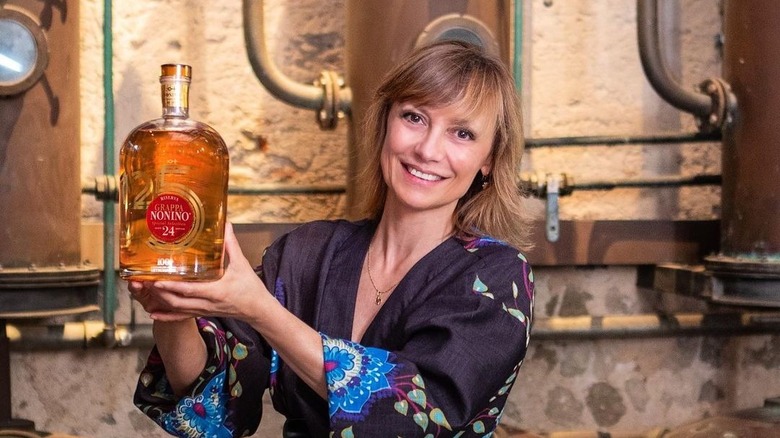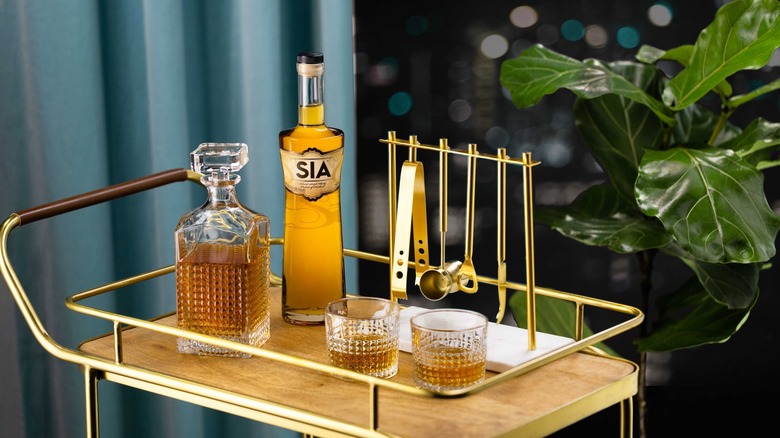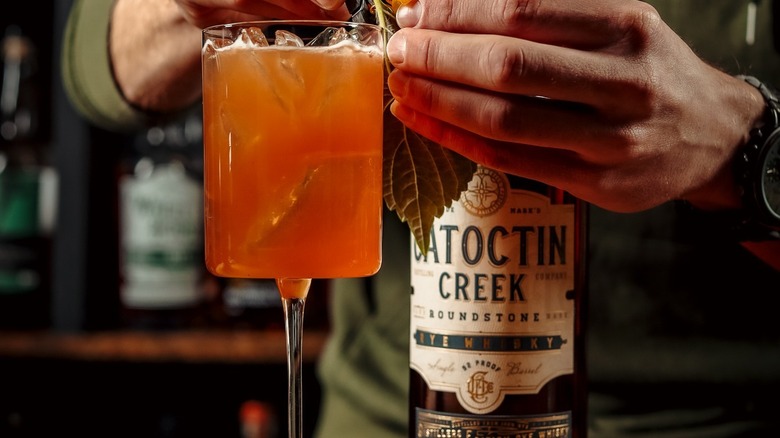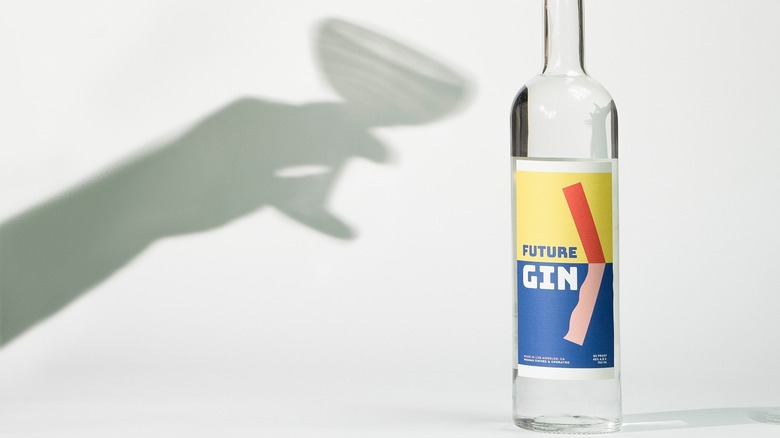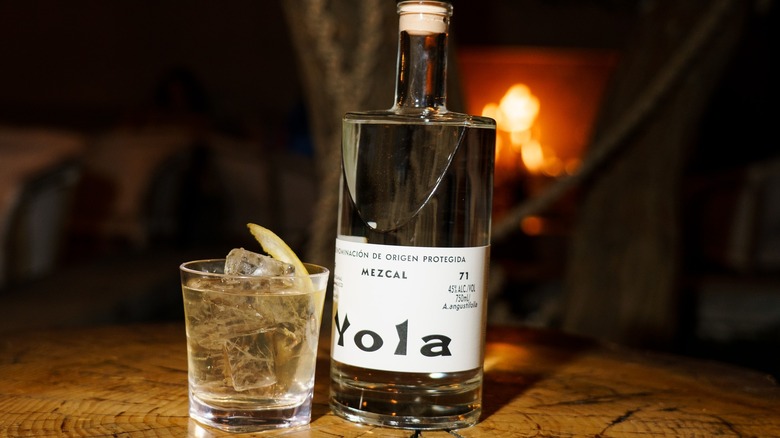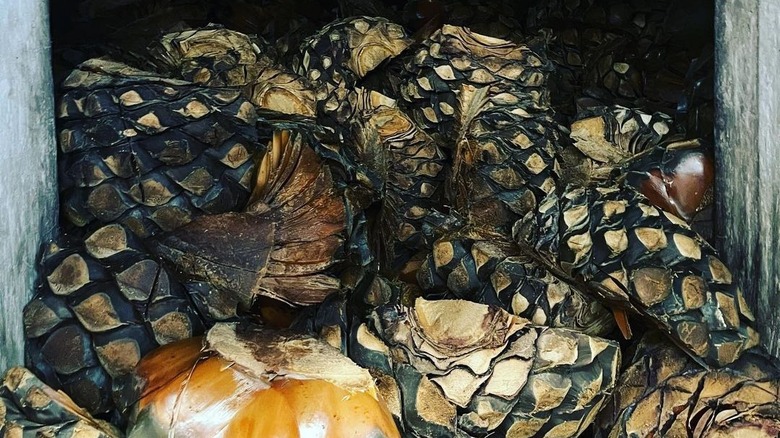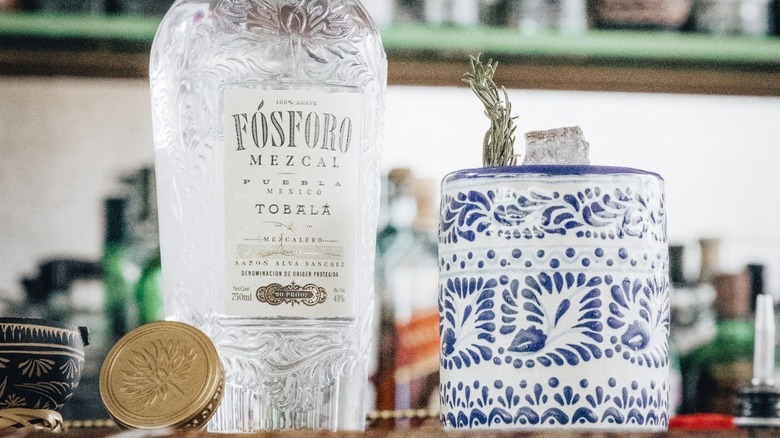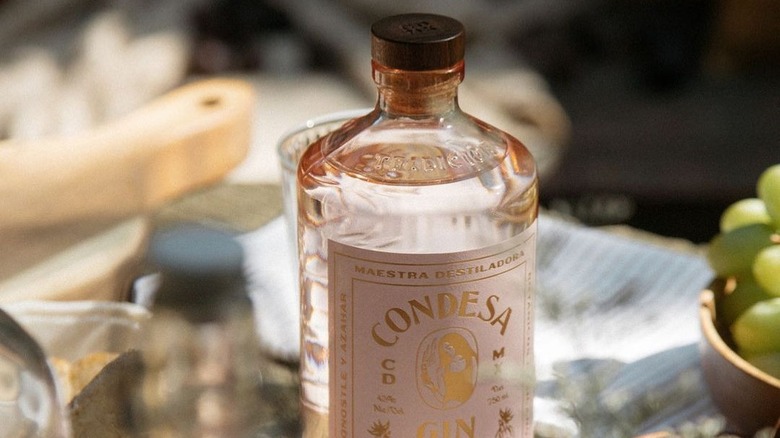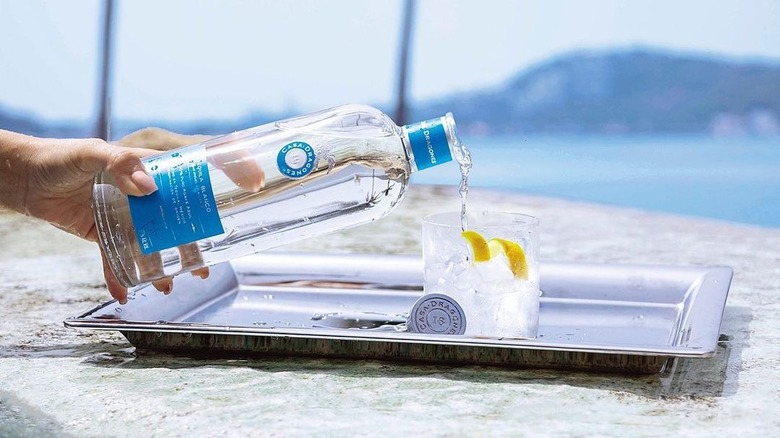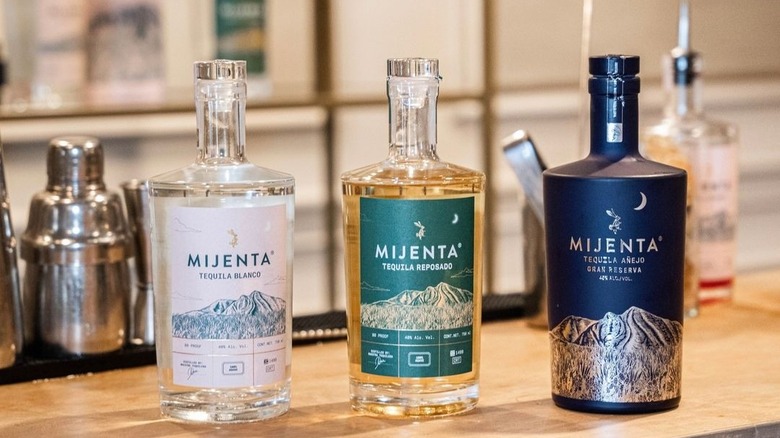24 Woman-Led Spirits Brands To Toast Women's History Month
Distilling is an ancient profession that has undoubtedly been dominated by men, often discouraging participation from women. Despite spirit-making being centuries old, the first known woman to have owned and run a distillery was Bessie Williamson, who took over the institutional Laphroaig distillery in Islay, Scotland in 1944, notes Scotch Whisky.
Luckily, as women like Lorena Vasquez, Joy Spence, and Jassil Villanueva Quintana have helped push distilling into the 21st century, more and more women are working at distilleries, opening up their own, and kickstarting their own brands. Today, there are countless woman-owned spirits brands out there, and while there remains a sharp disparity within the profession, the industry does, thankfully, seem to be tipping in the favor of equity.
In honor of Women's History Month, here are some woman-led spirits brands to help you celebrate the strides women around the world have made and continue to make in distilling and the spirits industry.
21 Seeds
Flavored spirits are often cast aside as tasting unnatural and of artificial additives, but 21 Seeds has turned tequila into a spirit bursting with a vibrant natural flavor that is great for both casual sipping and enhancing cocktails.
21 Seeds came about as a collaboration between Kat Hantas, her sister Nicole Emmanuel, and their friend Sarika Singh. Since 2019, 21 Seeds has been thriving and was acquired by spirits giants Diageo in 2022. Don't worry, though, the original founders are still in charge of making this incredibly unique tequila.
Bottles of 21 Seeds include Valencia Orange, Grapefruit Hibiscus, and Cucumber Jalapeño, each of which has received an array of awards and industry acclaim. 21 Seeds is a super simple, delicious way to instantly customize and refigure your favorite tequila cocktails. While adding fresh fruit or syrups to your shaker is a more conventional option, you can have yourself a spicy margarita by subbing in the Cucumber Jalapeño or an even brighter, citrus-forward Paloma with the Valencia Orange. The possibilities really are endless.
Spice Note
Spice Note is another line of infused tequilas, although this one is a spice-forward as opposed to fruit. Spice Note was founded by Sheetal Bhagat in 2018, per Alcohol Professor. If the name sounds familiar, that is because Bhagat was a contestant in the very first season of MasterChef, on which she finished in fourth place. So in case a spice-infused tequila had you skeptical, you can rest assured its founder is more than credible.
Bottles in the Spice Note lineup include Spice Note Cumin and Spice Note Cinnamon, which are naturally infused with spices and are inspired by the fusion of East Indian and Mexican cuisines made by Bhegat's mother growing up. Spice Note is a simple and delicious way to instantly add an extra layer of depth to any cocktail, or you can enjoy this flavorful spirit alone.
Catan Pisco
Pisco is a spirit that largely flows under the radar in the U.S. Pisco is distilled from grapes and, despite its popularity throughout South America, pisco is pretty much only produced in Chile and Peru, notes The Drinks Business. Catalina Gaete-Bentz is helping to mainstream the spirit more with Catan Pisco.
As Chile's first woman-owned pisco brand, Catan Pisco celebrates its Chilean heritage as well as the land it comes from with Catan H2O, an effort that donates a portion of profits to help farmers overcome the drought in Chile that has been going on for over a decade.
If you have never had pisco before, it is best described as a cross between tequila and vodka. It is a delicious, unique spirit that is used for a variety of cocktails, most notably the Pisco Sour. Your home bar is better off with a bottle, and Catan Pisco is one you should definitely go for.
Babel Gin
Babel Gin came out of Marva and Myriam Babel's cocktail bar, "Ode to Babel," located in Crown Heights, Brooklyn. A few years into the venture, the sister team created their very own spirit to go along with the business.
The ever-present juniper berry is supported by ingredients indigenous to the Caribbean, Africa, and Pacific Islands. The result is a botanically rich gin with flavors of cinnamon, jasmine, makrut lime, and ylang-ylang, a tropical tree that originated in the Philippines.
A spirit crafted specifically for a cocktail lounge is sure to be great for mixing, and this unique and layered gin is an excellent one to support if you are ever looking to go beyond the usual, mainstream brands. Babel Gin also recommends its spirit be sipped straight, which is definitely a less common way to enjoy the spirit. Nevertheless, a gin this flavorful and complex does not require any external support.
Big Nose Kate
Big Note Kate Western Whiskey was co-founded by Melissa Heim, who is also the brand's Master Distiller. Heim is widely revered in the whiskey world with decades of experience and success to her name, and she partnered with the other founders of Big Nose Kate in the middle of the COVID-19 pandemic.
Although an American whiskey, Heim decided that a whiskey dawning the name and image of Big Nose Kate had to accurately reflect her story. This is why it is a blend of American straight rye and American single-malt whiskeys. Heim believes this blend is the perfect reflection of the life and times of Big Nose Kate, an American folk-figure who is an iconic symbol of the Western frontier.
C. Cassis
C. Cassis is a woman-owned brand that is crafting a spirit you may not have known you needed on your home bar. Creme de cassis is a black currant liqueur that is used in classic cocktails like Trader Vic's El Diablo, and modern classics like the Bourbon Renewal by Jeffrey Morgenthaler.
The black currant liqueur by C. Cassis is an excellent expression of the spirit made by Rachael Petach in the Hudson Valley of New York. Petach uses fresh black currants grown locally to make this liqueur, which is quite rare to find in the U.S. considering a ban on growing the crop is still in effect in most U.S. states.
C. Cassis is a 16% ABV liqueur that is lightly fermented with an amount of sweetness that is not overpowering. It is refreshing and balanced enough to sip on its own and wonderfully fit for mixing into cocktails. As one of the few American-made blackcurrant liqueurs available, C. Cassis is well worth taking advantage of.
Kasama Rum
Rums are most commonly made on Caribbean islands, but Kasama is a Philippines-based rum brand that is reinventing the spirit. Kasama was founded by Alexandra Dorda as a celebration of her Filipino heritage, the name of the brand comes from the Filipino word for "together," which is the philosophy behind Dorda's rum.
Kasama Rum is a small-batch rum made from freshly-pressed noble cane juice, which is fermented, distilled, and then aged in American oak casks for seven years. The result is a rum that is tropical like a rum should be, but different from traditional rums on the market. Kasama's notes of pineapple, vanilla, and sea salt set it apart from other rums with a youthful, energetic vibe that is helping to put Filipino rum on the map.
Freeland Spirits
Freeland Spirits is a distillery based in Portland, Oregon that is not only a woman-founded and owned distillery and brand, but it is also entirely run by women.
After the release of its first gin in 2017, founder Jill Kuelher expanded production with Freeland Bourbon. After releasing a couple of canned cocktails featuring its spirits, Freeland added another gin to its repertoire, this one a navy-strength dry gin as well as a bottle of geneva.
Kuehler is proud of her distillery and the role it plays in putting women at the helm in a male-dominated industry. Freeland Spirits is a celebration of women in distilling — that includes everyone from the Master Distiller all the way to the farmers growing the grains are women, making it one of the few distilleries of its kind. Kuelher is also keen to point out that women are born with more taste buds than men, an advantage well worth noting when it comes to making booze.
Matchbook Distilling Company
This next spirits brand, founded by Leslie Merinoff-Kwasnieski, is one of the most unique distilleries in the country. Matchbook Distilling Company crafts spirits specifically for its clientele. Located in Long Island, New York, Matchbook Distilling works with small-scale farmers to create entirely unique spirits for restaurants, bars, and other private patrons.
Some of the spirits Merinoff-Kwasniewski has led the way on include one distilled from the juice of fresh pineapples roasted for three days in an earthen pit, which was then fermented for three weeks and then distilled into this one-of-a-kind spirit (via Punch). This is just one example of Matchbook's cunning and resourcefulness.
In addition to working closely with farmers, Matchbook Distilling is passionate about selling its spirits at a fair and accessible price. So, if you ever come across a bottle of Matchbook Distilling on a menu or are able to purchase a bottle yourself, it is guaranteed to be the only one of its kind.
Harridan Vodka
Harridan Vodka's founder, Bridgette Taylor, may not exactly be a harridan, but her passion for great spirits has surely led to a very well-made vodka that actually is spiritual experience.
Harridan Vodka is made in upstate New York using locally grown corn, which makes the vodka naturally gluten-free. While the distillation of grains to make vodka removes most of, if not all, the gluten present, doing so from corn makes it a sure thing. So, drinkers with strict gluten-free diets can enjoy Harridan just as much as anyone, another reason why one of the vodkas on your home bar should be this one.
One of its other two vodkas is the Midsummer Reserve, which is rested during the lunar eclipse in May, and the other is the Paranormal Reserve, of which only 666 bottles were released and were rested in a paranormal museum. Who thought vodka could be so spooky?
Crooked Water Spirits
In 2013,Heather Manley set out to make spirits in a way that would be unable to find elsewhere. After partnering up with a distiller, she crafted and released King's Point, a bourbon finished in Port Casks as the introductory spirit of the new brand, Crooked Water Spirits.
The catalog of spirits at Crooked Water now includes a selection of vodka, gins, various types of whiskeys, brandies, and other products. Crooked Water has grown into a one-stop shop for all of your liquor needs, as you can stock your home bar with all of the basics through this brand alone.
Local popularity helped get the brand going, which is now available to buy in Minnesota, Wisconsin, New York, Nevada, Montana, and California. Given its passion for approaching distilling with experimental recipes and unconventional barrel-aging and finishing, it would come as no surprise if Crooked Water reaches the shelves of every liquor store in the near future.
Catskill Provisions Distillery
This next spirits brand is another unique one, making honey the lifeblood of its operation. Catskill Provisions was founded by Claire M. Marin and originally started out as a hobby, but the hobby was not distilling. Instead, the brand was born out of beekeeping and is just one sector of Marin's business. Catskill Provisions strives to create products, including spirits and artisanal food items, using sustainably and ethically-sourced honey from its hundreds of beehives throughout upstate New York.
Honey is a natural friend to spirits, as the malt and barrel notes of whiskeys and botanicals found in gins are both complimented by it. Every one of Catskill Provisions' spirits is either distilled from honey, aged in honey barrels, or features the nectar in some way. A percentage of all sales is donated to bee and pollination conservation efforts, so supporting this unique brand of spirits is worth it in more ways than one.
OAX Original
If you have never had mezcal before, there may be no better place to start than with OAX Original. The smoky, agave-based spirit is currently undergoing an explosion of popularity, along with tequila, and a bottle of it is a must-have for your bar cart.
OAX Original was founded by Laura Giraudo, who fell in love with the spirit and the craft that goes into it. Upon her travels to the state of Oaxaca in Mexico, Giraudo partnered up with a third-generation mezcalero, or mezcal producer, Enrique Hernandez Zenea. Together they have been making three expressions of Oaxacan brilliance ever since.
What is perhaps even more impressive than the mezcals are the bottles they come in. Giraudo wanted to use her mezcal brand to highlight the expert craftsmanship found in Oaxaca. This includes the art of pottery, which is highlighted in a more contemporary way with an asymmetrical ceramic that is completely biodegradable. Every aspect of a bottle of OAX Original is a celebration of Oaxaca and the many different art forms championed in the state.
Uncle Nearest Premium Whiskey
Uncle Nearest is a whiskey brand with origins that date all the way back to the 1850s, when it was run by Nearest Green. Green began distilling while enslaved in Tennessee and continued doing so as a free man after the Civil War ended.
Today, over a century later, the brand is Uncle Nearest Premium Whiskey and is owned by Fawn Weaver, who founded the brand through her investment firm in 2016. Since then, the brand has grown from one state to being ing distributed to all 50, and is one of the most awarded American whiskey brands of the past five years.
Uncle Nearest produces seven different American whiskies, all compiling awards on the international stage, as well as the award for Master Blender Of The Year from Whisky Magazine, going to Victoria Eady Butler in 2022. If you like bourbon, rye, or any American whiskey, Uncle Nearest has you covered.
Nonino
Nonino is an excellent brand of Italian Amari, but much of its recent resurgence is justifiably owed to the invention of one of the most popular modern cocktails, the Paper Plane. The equal-parts combination of bourbon, Aperol, Amaro Nonino, and lemon juice has taken the mixology world by storm since Sam Ross created it in 2008 and the Italian spirits brand has reaped the benefits.
In the vast world of Italian Amari, the Nonino brand has long remained one of its leaders. Founded in 1897, the brand is now run by Gianoli Nonino, the wife of the original founder's great-grandson. Although Amaro Nonino Quintessentia remains the signature bottle of the brand, Nonino also distills a range of grappas, which is an Italian hard liquor, and other aperitifs. Its flagship bottle, however, is still made using the ancient family recipe and is just as good on the rocks as it is in a Paper Plane.
SIA Scotch Whisky
SIA Scotch Whisky was created because its founder, Carin Luna-Ostaseski, did not like how overwhelming getting scotch whisky was for beginners. For beginners, getting into scotch comes with a lot of intimidation due to the many styles it comes in, unfamiliar flavor notes, and wide price differentials.
For example, it is commonly pushed by so-called connoisseurs that scotch has to be sipped neat and that any other way of drinking it is wrong. In actuality, there are plenty of delicious and complex scotch whisky cocktails that can be made with a scotch like SIA. It is smooth, approachable, balanced, affordable, and a great option for any newcomer to the spirit in addition to those with experience.
A first-generation Cuban-American, Luna-Ostaseski discovered scotch through a friend before diving deep into learning as much as she could. Eventually, she came up with her own blend and became one of the first Hispanic women to own a Scotch whisky brand.
Catoctin Creek
When most people think of American whiskey, they think of bourbon, and therefore, Kentucky. However, the earliest origins of American whiskey actually belongs to Virginia, when George Thorpe's partnership with the Powhatan tribe led to him using their corn for distilling, the first of its kind in the so-called new world.
Virginia holds more of a claim to American whiskey than any other part of the country, and Catoctin Creek has been pushing that legacy forward since 2009. The brand was founded by Becky Harris and her husband Scott, and it produces a wide range of distinctly American spirits, made up of various ryes and brandies.
All Catoctin Creek spirits are locally grown and sourced, and the grains and fruits alike are additive and pesticide-free. This whiskey brand has made its Virginian heritage proud, as its signature Roundstone Rye has earned multiple awards on the international stage.
Future Gin
California is a wine-making powerhouse, but its bounty of unique resources and forward-thinking mindset is what helped create the final spirits brand on the list. Future Gin was founded by Amy Atwood, Mary Bartlett, Freya Estreller, and Natasha Case, four women who set out to create a distinctly Californian gin. This women and queer-owned gin company is as unique as it sounds and it is one of the spirits expanding the Golden State beyond wine and craft beer.
Future Gin is made with a botanical base traditional to a dry gin, including juniper berry, coriander, and angelica root. This base is then combined with Californian ingredients like grapefruit, Meyer-lemon, honeysuckle, avocado leaves, and grape leaves.
The result is a unique and layered gin, specific to the location it is made but reminiscent of its timeless framework. It is traditional enough for any gin cocktail, and unique enough to take those cocktails to another level of complexity.
Yola Mezcal
There's plenty of female power behind this artisanal mezcal, founded by Yola Jiménez. The story of Yola can be tracked back to 1971 when maestro mezcalero Javier Bautista experimented with several mezcal recipes alongside his friend (and Yola's grandfather) Luis Jiménez, in a small farm and distillery in San Juan del Río, a village in Oaxaca. As a young girl, Yola enjoyed summers at the farm, but she told Vogue that she grew up with the idea that she'd never succeed in a rural area like Oaxaca. She spent time in London and New York, but when her grandfather passed away, she knew it was time to return home and take charge.
Teaming up with singer Lykke Li and Gina Correll Aglietti, Yola launched Yola Mezcal, seeking not just to honor Oaxaca's mezcal-making traditions but to provide fair wages and childcare to the all-female team who works at the distillery. The lineup includes Javier's daughter, Guadalupe, who holds the prized position of Maestra Mezcalera. You can find three expressions of Yola Mezcal: 1971, a blend of espadín and madrecuixe agaves; Pechuga, infused with seasonal fruit like lime, guava, orange, and pineapple; and Jabalí, a limited-edition wild agave that comes in a unique bottle designed by Mexican artist Bárbara Sánchez-Kane.
La Gritona Tequila
La Gritona is Spanish for "the yeller," and we love this name for a brand that gives us so much to talk about. Melly Barajas is the master distiller who leads the all-female team at La Gritona's headquarters in Valle de Guadalupe, in the Jalisco highlands (not to be confused with Valle de Guadalupe in Baja California, Mexican wine country). Guadalajara-born Melly started making tequila in 1999 as a gesture of love to her dad, who once told her he wanted a tequila brand launched in his honor. She opened her own distillery, Raza Azteca, which today produces La Gritona along with other tequila brands. Today, Melly is one of the 12 women in Mexico who own tequila-making companies.
Melly and her team use agave plants that have reached maturity after 8 to 10 years, allowing them to reach their highest sugar content. They cook and ferment the agave, then distill the juices twice before allowing the tequila to rest in reused Jack Daniels and Balcones whiskey barrels for eight months. The result is an herbal, crisp reposado tequila presented in hand-blown recycled glass bottles. La Gritona is best when enjoyed neat.
Fósforo Mezcal
Puebla, one of Mexico's lesser-known mezcal-producing states, is the birthplace of Fósforo. Although this mezcal brand is relatively new, its existence had been a longtime dream for its founders, husband-and-wife team Lisa Detwiler and Jim Cramer (of Mad Money fame). As fans of mezcal's smoky, complex flavors, the couple dreamed of launching their own brand until they found the perfect allies in 2018: Aarón Alva Sánchez, a fourth-generation mezcal master, and his wife, Mariana Hernández. With her drive and intelligence, Mariana is in charge of Fósforo's commercial strategy and has been essential to the brand's development over the past few years.
As for Aarón, he dedicates his genius to growing wild tobalá, one of the hardest agave species to grow. The result of his exquisite work can be experienced in Fósforo's two expressions. Fósforo Tobalá is a clear mezcal with notes of ripe fruit, honey, and bell pepper on the nose, as well as cooked agave and fresh herbs on the palate. Its counterpart is Fósforo Tobalá Penca, which is aged in glass vessels with agave leaves between one and three months and boasts aromas of caramel, leather, and spices, as well as floral and toasted notes on the palate.
Condesa Gin
Inspired by Mexico's curanderas, wise female healers known for their use of herbs in spiritual rituals and ceremonies, Condesa Gin incorporates mystical, sustainably sourced botanicals into its unique recipes. This small-batch gin honors Mexico City's hip, creative Condesa neighborhood with its name, and its beautiful bottles (blue for Clásica, pink for Prickly Pear & Orange Blossom) show a modern healer on the label.
The all-female team behind Condesa Gin is led by master distiller Hilhamm Salomé, who has developed two gorgeous expressions that are perfect for mixing in modern cocktails. Condesa Gin Clásica, a warm and bitter extra dry gin, features herbs and flowers that are traditionally used in energy-cleansing rituals, as well as in ceremonies to attract love, such as palo santo, sage, rosemary, lavender, elderflower, and myrrh. As for Condesa Gin Prickly Pear and Orange Blossom, it boasts floral, citrusy notes, seeking to capture a Mexican sunset in a bottle.
Tequila Casa Dragones
As the first Maestra Tequiliera certified by the Mexican Academy of Tequila Tasters, Mexico City-born Bertha González Nieves is known as "the first lady of tequila," a well-earned nickname after more than two decades in the industry. Bertha, who fell in love with tequila the first time she saw an agave field, co-founded Casa Dragones in 2008. The brand was launched a year later. Today, Bertha is the CEO and face of the ultra-premium tequila brand, which produces its prized liquid in Jalisco and has its home in San Miguel de Allende.
Beloved by chefs and bartenders, Casa Dragones has four expressions. Casa Dragones Joven, the brand's first launch, is a smooth blend of silver and extra-aged tequila, while Casa Dragones Blanco is a crisp silver tequila perfect for a classic cocktail. The house's aged tequila, Casa Dragones Añejo, is aged in two types of wood barrels, resulting in a smooth, agave-forward liquid, while its latest release, Casa Dragones Reposado Mizunara, is aged in Japanese oak casks and boasts an elegant, sweet profile.
Mijenta Tequila
When talking about Mijenta Tequila, there are two names you need to know. The first one is Ana María Romero, the Maestra Tequilera whose more than 25 years of knowledge and experience reflect on every drop of tequila produced by the brand. The second is Elise Som, the Paris-born sustainable designer who is the Director of Sustainability and co-founder of Mijenta. After several years of design experience, Elise partnered with Mike Dolan and Juan Coronado to launch Mijenta. Since the very beginning, Elise and her team have worked toward creating a truly sustainable operation, which entails everything from avoiding pesticides in the agave fields to using recycled materials in their packaging. The result: Mijenta is a carbon-neutral brand and is the first B-Corp-certified tequila in the market.
Mijenta boasts three expressions. Mijenta Blanco is an elegant, sweet silver tequila with notes of honey, vanilla, and cinnamon. Aged for six months in a blend of three barrels, Mijenta Reposado offers aromas of vanilla, bergamot, and orange blossom, as well as notes of cooked agave and cacao nibs on the palate. The most complex of the trio is Mijenta Añejo, aged for around 18 months in four types of casks. The complex liquid shows aromas of cooked agave, tobacco, and butterscotch, as well as notes of dried fruit and coffee on the palate.
